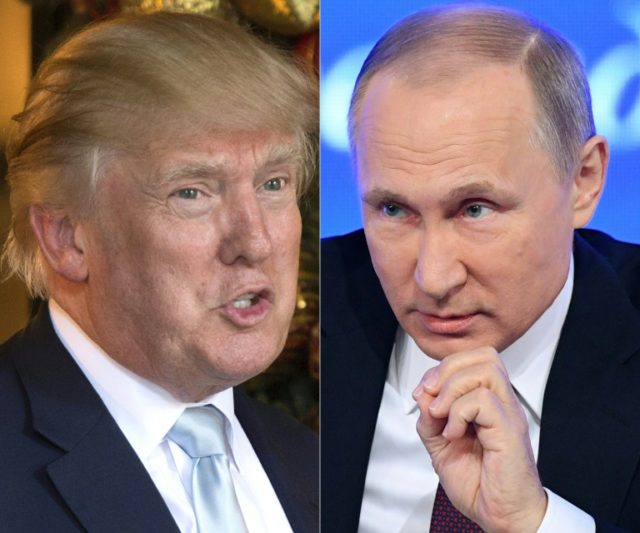Kremlin spokesman Dmitry Peskov told ABC News this weekend that his boss, President Vladimir Putin, hopes to meet U.S. counterpart Donald Trump as soon as possible and expects the bilateral relationship to improve after having established personal contact.
“If two president’s meet each other, if they exchange views and if they decide that they want to reestablish a dialogue, then there will be a chance for relations to get better,” Peskov told the host of ABC’s This Week George Stephanopoulos.
Peskov added that Putin was “ready” for such a meeting but echoed the head of state’s reservations, as he described them last week, that the political climate in America may be too tumultuous for a Trump-Putin summit. Peskov said the current relationship between the two countries was “maybe even worse” than a “new Cold War” and blamed media speculation about Russian meddling in the 2016 presidential election for much of that tension.
“Lots of Americans – they do think that, yes, Russian hackers are in everywhere. Russian hackers are in every fridge. Russian hackers are in every iron and so on and so forth but this is not true. Those are fake news and this is slander,” Peskov argued.
President Trump spoke to Putin in a phone call shortly following his inauguration in January. That interaction, according to the White House, lasted 30 minutes. Neither side informed reporters on the contents of the call, though Peskov in his capacity as a spokesman for Putin said at the time that it was a “good, constructive conversation” that the Kremlin hoped would result in scheduling an in-person meeting.
Peskov’s remarks this weekend followed statements by Putin himself at a press conference on Thursday where he insisted he was “ready” to speak to Trump at a summit soon but that such a meeting “depends to a large extent on the American side.” He predicted that U.S. “squabbles” over alleged Russian meddling in the U.S. election “at a certain point in time it will come to a close” and then “we will decide when and where the meeting is held.”
Putin expressed hope that Trump would meet him in person at the Arctic Council summit in May, held in Finland. “Finland, in my view, is a very convenient country, and Helsinki is a very suitable platform for organizing such events,” he said, according to the Russian news outlet TASS. Putin suggested a G20 summit sideline meeting in July as an alternative.
Last month, Peskov appeared to express some frustration at the pace of development of the bilateral relationship with the Trump White House. “There has been little meaningful communication between Washington and Moscow,” Peskov told CNN. “Unfortunately, we don’t have a better understanding of when this dialogue can begin.”
Since then, the mainstream media’s criticism of the Trump administration for alleged ties to Russia has intensified and so has the urgency to keep an open line of communication with the Russian military. Last week, the U.S. military commander in charge of the operation against the Islamic State in Syria and Iraq warned that Russian troops were conducting operations, ostensibly also against the Islamic State, within very close quarters of their American counterparts.
The soldiers of the two countries, Army Lt. General Steven Townsend said, “have converged literally within hand-grenade range of each other.” While both the United States and Russia claim to be present in Syria to fight the Islamic State terrorist group, the Russian government supporters Syrian dictator Bashar al-Assad, which the United States does not. American Ambassador to the UN Nikki Haley noted last week, however, that deposing Assad was not a “priority” for the United States the way eliminating ISIS is, a pivot away from the policy of the Obama White House.
Haley has also aggressively condemned the Putin government for, among other actions, their invasion and colonization of the sovereign territory of Ukraine. “The dire situation in eastern Ukraine is one that demands clear and strong condemnation of Russian actions. The sudden increase in fighting in eastern Ukraine has trapped thousands of civilians and destroyed vital infrastructure, and the crisis is spreading, endangering many thousands more. This escalation of violence must stop,” Haley said during her first appearance as ambassador at the UN.
On television Sunday, Haley said the White House was “not stopping me from beating up on Russia” when necessary, nor did she feel compelled to stop.

COMMENTS
Please let us know if you're having issues with commenting.